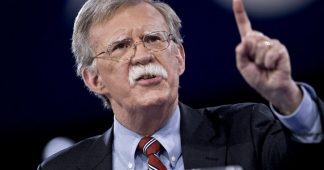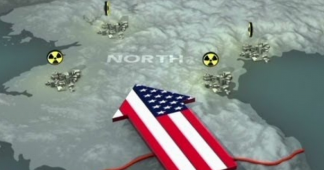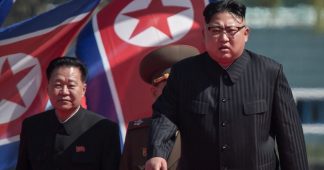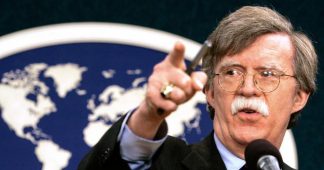Apr. 10, 2018
When America launches a preemptive attack on North Korea, will the US find itself at war with China?
This is not an idle question. On Monday, the fiercest advocate of a preemptive attack on North Korea, John R. Bolton, joined the Trump Administration. Bolton, a former US Ambassador to the UN, replaces H. R. McMaster as President Donald Trump’s national security adviser.
Bolton is the gold standard against which all other hawks are measured. Bolton pushed for war in Iraq and continues to think that invading Iraq was the right thing to do. He has long clamored for regime change in North Korea (and Iran…and Syria…and Cuba).
Bolton knows that North Korea relies on nuclear weapons for its continued survival. You will hear the same from anyone on the left. But Bolton adds that North Korea also has nukes because the North Koreans “still want to reunify the Korean peninsula under their control.” This prospect naturally upsets Bolton who wants a reunified Korea that is under American hegemony.[1]
Bolton insists that North Korea’s nuclear weapons pose an existential threat to the US which cannot be tolerated. Bolton claims that within months North Korean leader Kim Jong Un will have ballistic missiles which can reach the continental US. Once that happens, will the US be willing to go to war to save South Korea at the price of one or more American cities? The question, however, glosses over the fact that Kim would have to be suicidal to use nuclear weapons against the US.
Bolton shared his perspective on China in a December 20, 2017 interview on the FOX Business Network. Bolton may well owe his appointment as national security adviser to his frequent appearances on FOX, Trump’s cracked window on the world.
Bolton was asked about reports that Russian and Chinese armed forces are training together in anticipation of a US attack on North Korea. Bolton was unfazed, pronouncing the “odds” of a joint Russian-Chinese military response “between slim and none.” Who’s your oddsmaker, John? General Douglas MacArthur thought there was no chance China would intervene in the first Korean War.
“There is one diplomatic [sic] play left with China,” Bolton told FOX Business. “To say: ‘You want to get rid of the North Korean nuclear threat? The way to do that is to get rid of this regime.’” Why Bolton calls this a “diplomatic play” is beyond me inasmuch as Bolton is calling on China to use force against the North Koreans, either alone or partnered with the US.[2] Bolton said that “even in China there have been public pieces written recommending joint Chinese-American military intervention in North Korea to bring down the Kim Jong Un regime.”[3]
Since Bolton’s FOX Business interview in December, Bolton has abandoned hopes for a Chinese-American pile up on Kim. The Atlantic’s Uri Friedman says that Bolton “doubt[s] the Chinese could be convinced to reverse their longstanding policy of resisting regime change in North Korea.”
Maybe. Professor Oriana Skylar Mastro of Georgetown University’s Edmund A. Walsh School of Foreign Service has a different view. “China is no longer wedded to North Korea’s survival,” Mastro writes in the January-February issue of Foreign Affairs. “Over the last two decades, Chinese relations with North Korea have deteriorated drastically … as China has tired of North Korea’s insolent behavior.” “[T]oday, China and North Korea can hardly be characterized as friends, let alone allies.”
How Will War on the Korean Peninsula Play Out?
According to Mastro, China will intervene in a war on the peninsula not to save Kim’s regime, but in order to safeguard China’s own interests—first and foremost, preventing Kim from using his nuclear weapons. Mastro predicts that China will intervene early on to seize North Korean nuclear sites. Kim’s principal nuclear installations and two-thirds of his missile sites are within 60 miles of the Chinese border. China will also see to it that Kim’s nukes do not fall into the hands of the South Koreans.
The US also wants to disarm Kim. Kim’s nuclear facilities are numerous and widely dispersed throughout the DPRK. Nor does the US know the locations of all of them. To secure all of them will require a ground invasion. That will require a US invasion force of anywhere between 200,000 and 690,000 troops. This will create the frightening possibility of accidental armed clashes between US and Chinese forces as both nations attempt to seize Kim’s nuclear sites. These clashes could easily escalate to all-out war.
Mastro writes that communication and coordination between China and the US are essential to keep the two superpowers from coming to blows. Is Bolton the right person to ensure communication and coordination with the Chinese? We have already seen how Bolton has written the Chinese off as a US partner. In any event, Beijing may be less than enthusiastic about working with a country that has opened a trade war against it.
The picture becomes more terrifying when we consider that Chinese, American, and South Korean forces may not make it to Kim’s nuclear sites in time. Bruce Bennett, an expert on North Korea at the RAND Corporation, references the Cold War concept “Use ‘em or lose ‘em.” If Kim concludes that he is in danger of losing his nukes to his enemies, he may use them. The Second Korean War will have gone nuclear.
The war may go nuclear in any case. The North’s nuclear weapons (and biological and chemical weapons) may be Kim’s first resort rather than a desperate last resort for a Kim Jong Un facing defeat. Kim would have no trouble finding uses for his nukes in the event of an American invasion. For instance, nuclear bombs could destroy the South Korean harbor of Busan in order to head off US troop and supply ships.
A Season for Summits
On March 8, Trump accepted Kim Jong Un’s invitation for a summit which is expected to take place before the end of May. Trump’s new national security adviser believes that “Talking to the North Koreans is a waste of time.” Bolton is certain that the summit will accomplish nothing other than to demonstrate that Kim has no intention of giving up his nuclear weapons.
On March 25-28, Kim Jong Un traveled to Beijing at the invitation of Chinese President Xi Jinping. This was Kim’s first trip outside the country since he became DPRK leader in 2011 and his first meeting with Xi. What was Kim doing there? One possibility is that Kim was in Beijing to eat crow. Facing a US attack, Kim needs to get China back in his corner. “What I’m guessing happened in the meeting,” Professor Oriana Skylar Mastro told Vox, “is that Xi chastised Kim for his nuclear and missile tests and made him promise not to do them again.”
Another view has Kim, not as a cringing supplicant to China, but as master of the situation. Sung-Loon Lee of the Fletcher School for Law and Diplomacy calls Kim an “Impresario” who is playing Washington and Beijing against each other. The summit with Xi, like Kim’s invitation to meet with President Donald Trump, is just the latest in a series of “faux peace gesture[s].”
As China has gained in strength and confidence, its need for the DPRK as a buffer state has declined. That is one reason China might be willing to sacrifice the DPRK. Still, China has no WELCOME mat out for the US military. Recall that most of Kim’s nuclear installations are within 60 miles of the Yalu River which separates North Korea from China. In order to secure Kim’s nuclear sites, US and South Korean forces will have to approach the Yalu. The last time the US Army approached the Yalu was in October 1950. That triggered China’s full-scale entry into the war. Professor Robert Farley of the University of Kentucky points out that even after China entered the war, President Harry Truman was careful not to allow US forces to cross the Yalu. This time, Farley believes, the US would not declare Chinese territory off limits from attack. American bombing and invasion of China could easily escalate to a nuclear World War Three.
The US needs to do several things:
+ Reject an attack on North Korea.
+ Accept China’s proposal of a “double freeze,” e., Kim suspends his nuclear program and missile testing; the US and South Korea suspend their annual joint war games.
+ Conclude a peace treaty to finally bring the Korean War officially to a close.
Cool-headed, cautious diplomacy will be essential to achieve these ends. Cool-headedness and caution are the last thing we can expect from Trump and Bolton.
Over time, all parties should work for a reunified Korean Peninsula. China would accept South Korea as the government of a reunified Korean Peninsula so long as US troops were withdrawn and the US-South Korean military alliance terminated. North Korea’s nukes would be destroyed and US nuclear-armed submarines banned from the region. The US empire would be dealt a resounding blow. This may all be a pipe dream, but it is the only way to preserve peace on the peninsula long-term.
Notes.
[1] On the other hand, in his December 20 FOX Business interview (see below), Bolton magnanimously said that Beijing could install any successor government it likes, so long as a post-Kim government does not have nukes. This may be Bolton’s fallback position if the US is unable to conquer the DPRK.
When America launches a preemptive attack on North Korea, will the US find itself at war with China?
This is not an idle question. On Monday, the fiercest advocate of a preemptive attack on North Korea, John R. Bolton, joined the Trump Administration. Bolton, a former US Ambassador to the UN, replaces H. R. McMaster as President Donald Trump’s national security adviser.
Bolton is the gold standard against which all other hawks are measured. Bolton pushed for war in Iraq and continues to think that invading Iraq was the right thing to do. He has long clamored for regime change in North Korea (and Iran…and Syria…and Cuba).
Bolton knows that North Korea relies on nuclear weapons for its continued survival. You will hear the same from anyone on the left. But Bolton adds that North Korea also has nukes because the North Koreans “still want to reunify the Korean peninsula under their control.” This prospect naturally upsets Bolton who wants a reunified Korea that is under American hegemony.[1]
Bolton insists that North Korea’s nuclear weapons pose an existential threat to the US which cannot be tolerated. Bolton claims that within months North Korean leader Kim Jong Un will have ballistic missiles which can reach the continental US. Once that happens, will the US be willing to go to war to save South Korea at the price of one or more American cities? The question, however, glosses over the fact that Kim would have to be suicidal to use nuclear weapons against the US.
Bolton shared his perspective on China in a December 20, 2017 interview on the FOX Business Network. Bolton may well owe his appointment as national security adviser to his frequent appearances on FOX, Trump’s cracked window on the world.
Bolton was asked about reports that Russian and Chinese armed forces are training together in anticipation of a US attack on North Korea. Bolton was unfazed, pronouncing the “odds” of a joint Russian-Chinese military response “between slim and none.” Who’s your oddsmaker, John? General Douglas MacArthur thought there was no chance China would intervene in the first Korean War.
“There is one diplomatic [sic] play left with China,” Bolton told FOX Business. “To say: ‘You want to get rid of the North Korean nuclear threat? The way to do that is to get rid of this regime.’” Why Bolton calls this a “diplomatic play” is beyond me inasmuch as Bolton is calling on China to use force against the North Koreans, either alone or partnered with the US.[2] Bolton said that “even in China there have been public pieces written recommending joint Chinese-American military intervention in North Korea to bring down the Kim Jong Un regime.”[3]
Since Bolton’s FOX Business interview in December, Bolton has abandoned hopes for a Chinese-American pile up on Kim. The Atlantic’s Uri Friedman says that Bolton “doubt[s] the Chinese could be convinced to reverse their longstanding policy of resisting regime change in North Korea.”
Maybe. Professor Oriana Skylar Mastro of Georgetown University’s Edmund A. Walsh School of Foreign Service has a different view. “China is no longer wedded to North Korea’s survival,” Mastro writes in the January-February issue of Foreign Affairs. “Over the last two decades, Chinese relations with North Korea have deteriorated drastically … as China has tired of North Korea’s insolent behavior.” “[T]oday, China and North Korea can hardly be characterized as friends, let alone allies.”
How Will War on the Korean Peninsula Play Out?
According to Mastro, China will intervene in a war on the peninsula not to save Kim’s regime, but in order to safeguard China’s own interests—first and foremost, preventing Kim from using his nuclear weapons. Mastro predicts that China will intervene early on to seize North Korean nuclear sites. Kim’s principal nuclear installations and two-thirds of his missile sites are within 60 miles of the Chinese border. China will also see to it that Kim’s nukes do not fall into the hands of the South Koreans.
The US also wants to disarm Kim. Kim’s nuclear facilities are numerous and widely dispersed throughout the DPRK. Nor does the US know the locations of all of them. To secure all of them will require a ground invasion. That will require a US invasion force of anywhere between 200,000 and 690,000 troops. This will create the frightening possibility of accidental armed clashes between US and Chinese forces as both nations attempt to seize Kim’s nuclear sites. These clashes could easily escalate to all-out war.
Mastro writes that communication and coordination between China and the US are essential to keep the two superpowers from coming to blows. Is Bolton the right person to ensure communication and coordination with the Chinese? We have already seen how Bolton has written the Chinese off as a US partner. In any event, Beijing may be less than enthusiastic about working with a country that has opened a trade war against it.
The picture becomes more terrifying when we consider that Chinese, American, and South Korean forces may not make it to Kim’s nuclear sites in time. Bruce Bennett, an expert on North Korea at the RAND Corporation, references the Cold War concept “Use ‘em or lose ‘em.” If Kim concludes that he is in danger of losing his nukes to his enemies, he may use them. The Second Korean War will have gone nuclear.
The war may go nuclear in any case. The North’s nuclear weapons (and biological and chemical weapons) may be Kim’s first resort rather than a desperate last resort for a Kim Jong Un facing defeat. Kim would have no trouble finding uses for his nukes in the event of an American invasion. For instance, nuclear bombs could destroy the South Korean harbor of Busan in order to head off US troop and supply ships.
A Season for Summits
On March 8, Trump accepted Kim Jong Un’s invitation for a summit which is expected to take place before the end of May. Trump’s new national security adviser believes that “Talking to the North Koreans is a waste of time.” Bolton is certain that the summit will accomplish nothing other than to demonstrate that Kim has no intention of giving up his nuclear weapons.
On March 25-28, Kim Jong Un traveled to Beijing at the invitation of Chinese President Xi Jinping. This was Kim’s first trip outside the country since he became DPRK leader in 2011 and his first meeting with Xi. What was Kim doing there? One possibility is that Kim was in Beijing to eat crow. Facing a US attack, Kim needs to get China back in his corner. “What I’m guessing happened in the meeting,” Professor Oriana Skylar Mastro told Vox, “is that Xi chastised Kim for his nuclear and missile tests and made him promise not to do them again.”
Another view has Kim, not as a cringing supplicant to China, but as master of the situation. Sung-Loon Lee of the Fletcher School for Law and Diplomacy calls Kim an “Impresario” who is playing Washington and Beijing against each other. The summit with Xi, like Kim’s invitation to meet with President Donald Trump, is just the latest in a series of “faux peace gesture[s].”
As China has gained in strength and confidence, its need for the DPRK as a buffer state has declined. That is one reason China might be willing to sacrifice the DPRK. Still, China has no WELCOME mat out for the US military. Recall that most of Kim’s nuclear installations are within 60 miles of the Yalu River which separates North Korea from China. In order to secure Kim’s nuclear sites, US and South Korean forces will have to approach the Yalu. The last time the US Army approached the Yalu was in October 1950. That triggered China’s full-scale entry into the war. Professor Robert Farley of the University of Kentucky points out that even after China entered the war, President Harry Truman was careful not to allow US forces to cross the Yalu. This time, Farley believes, the US would not declare Chinese territory off limits from attack. American bombing and invasion of China could easily escalate to a nuclear World War Three.
The US needs to do several things:
+ Reject an attack on North Korea.
+ Accept China’s proposal of a “double freeze,” e., Kim suspends his nuclear program and missile testing; the US and South Korea suspend their annual joint war games.
+ Conclude a peace treaty to finally bring the Korean War officially to a close.
Cool-headed, cautious diplomacy will be essential to achieve these ends. Cool-headedness and caution are the last thing we can expect from Trump and Bolton.
Over time, all parties should work for a reunified Korean Peninsula. China would accept South Korea as the government of a reunified Korean Peninsula so long as US troops were withdrawn and the US-South Korean military alliance terminated. North Korea’s nukes would be destroyed and US nuclear-armed submarines banned from the region. The US empire would be dealt a resounding blow. This may all be a pipe dream, but it is the only way to preserve peace on the peninsula long-term.
Notes.
[1] On the other hand, in his December 20 FOX Business interview (see below), Bolton magnanimously said that Beijing could install any successor government it likes, so long as a post-Kim government does not have nukes. This may be Bolton’s fallback position if the US is unable to conquer the DPRK.











